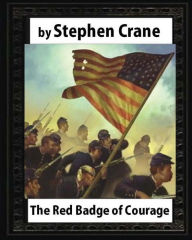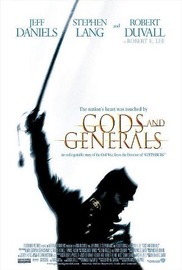Don't miss your chance to invest in 'Fabiola'!
Visit our crowd-funding page for Catholic movies!
- Home
- The Importance Of Good Stories
- The Red Badge Of Courage
The Red Badge Of Courage
Book Summary
Although not our favorite book, we have provided The Red Badge of Courage book summary because Stephen Crane's novel does hold many useful lessons as they are learned by his main character, Henry Fleming.
In this novel, Stephen Crane's main character, Henry Fleming, develops into manhood in a way that only war can accomplish while he fights through the terrors presented to him as he fights for the Union during America’s Civil War.
Henry’s chief weakness in the beginning of the novel is fear. As Henry is surrounded with the bravery of the other soldiers, he compares himself to them and is disgusted with himself.
Henry transforms into a true hero by the end of the story. Follow Henry on his adventure through the emotional struggles he faces during the war.
Henry's Greatest Weakness: Fear
Henry’s greatest fault is fear. He is afraid of the enemy, afraid of death and, in a way, afraid of himself. He has a twisted perspective of the enemy as a sweeping monster that will strike death in any it touches.
Although he tells all around him that he was made for war and that he will hold out to the end, Henry's fear of death comes to him when he first starts contemplating what it would be like to be in an engagement.
He habitually overthinks things. When he imagines himself in the battle, he is afraid that he will not have the strength to stay and fight. It is his telling himself that he does not have this strength that makes his courage fail when he is on the battlefield.
When he realizes that he has deserted, he is filled with shame when he deserts and does not what anyone to know about it. Henry is faced with a new fear: the fear of what his fellow soldiers will think of him. If Henry continues feeling these fears, he will never be a good soldier, and he knows it.
Dealing With Fear
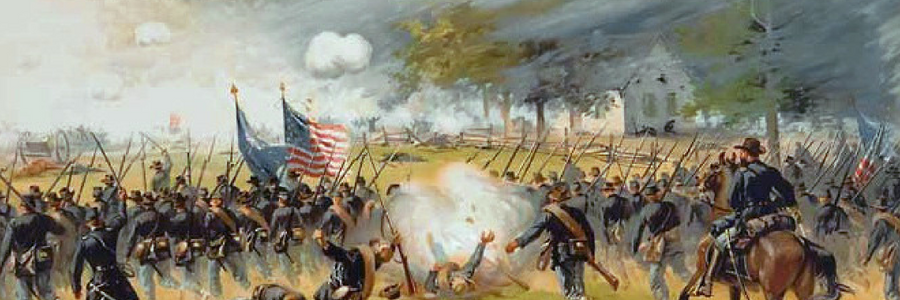
Henry, overthinking as always, tries to first tell himself that he will not run when the time for fighting comes. When he is actually in an engagement, he deserts. He realizes his mistake but, instead of being humble and admitting he was wrong, he tells himself that he was a reasonable being and everyone who stayed to fight was out of their minds.
He returns to the soldiers and tries to pass himself off as though he fought and was there all along. He tells no one of his fault and continues to have the same attitude as before. “He had performed his mistake in the dark, so he was still a man."
When he meets an old friend, Wilson, in his regiment, Henry compares himself to his friend, trying to make them the same. He knows deep down, however, that they are not the same because he is a deserter and Wilson is a loyal soldier.
Who Henry Is In The End
By the end of The Red Badge of Courage, Henry has put his fears behind him and “learned as a man does”. He and Wilson are recognized by their officers for their noticeable good courage while fighting. Through his fighting during these later engagements, Henry recognizes his past foolishness and is able to look at his failings as a learning experience.
He realizes he learned much from being the deserter and fighting through his doubts. Studying his deeds, failures and achievements, Henry knows that his greatest achievement is that he overcame his many childish fears. When four prisoners are taken he sees that they are only men like himself, fighting for a cause that they believe is right. He understands death in a new way too. “He had been to touch the great death, and found that, after all, it was but the great death.” He is gleeful when he discovers how he despises his failures.
Henry comes to understand that to become a man to is to recognize mistakes and to loathe them. He sees that he was good. Henry now knows that pride will get him nowhere. He sees what he was in the beginning and is disgusted with himself. He now feels that he is like Wilson, able to look back at his past actions on the field with nothing but soldierly satisfaction.
The Red Badge of Courage Bottom Line
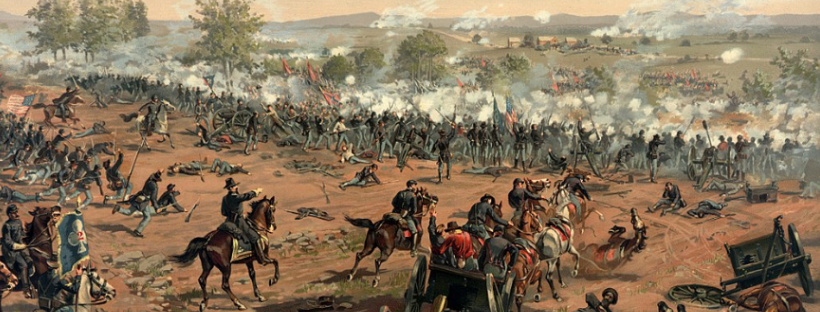
In The Red Badge of Courage, Henry murdges from a stuck-up coward into a courageous man. Although he is overcome with the fear of death in the beginning, he learns that he must face his fears if he wishes to overcome them. He sees how his companions are like him but, because they possess courage they overcome their obstacles sooner than he did.
He sees his mistakes with new eyes and is glad to recognize them for that they are and despises them. Henry knows who he is and that it is far more rewarding to be in danger and later praised for his courage than to be safe from danger and know that he was a coward.He becomes a true hero by the end of the story.
In The Red Badge of Courage, Stephen Crane demonstrates how war is a combination of good and bad. There is a strong sense of evil that men should be so divided, especially fellow Americans. But, the reader sees the benefits. All the characters’ personalities improve in the story.
The war made them realize that they were one, together, and that nothing could be won by an individual. “Sometimes he inclined to think them all heros. He admitted in secret the superior development of the higher qualities on others.” Compared to the other characters, Henry’s developments seem to delay as a cause of his deserting and pride.
A Note On The Style
It was a very interesting read in the fact that it was based on the viewpoint of a common soldier. The other works I have read or watched such as the movie Gettysburg or the chapter on the Civil War in Anne Carroll's book Christ in the Americas are very focused on the prominent people such as General Longstreet, General Lee, or General Grant.
This book, however, was focused on a nobody who did not realize that the generals had a good knowledge of the situation. Henry was actually many times angry with the generals, based solely on the knowledge of what was going on with just his regiment. I found that very interesting.
Are You Looking For More Works On The American Civil War? Check Out These Resources.
Catholics Of The Confederacy by Michael Shumaker
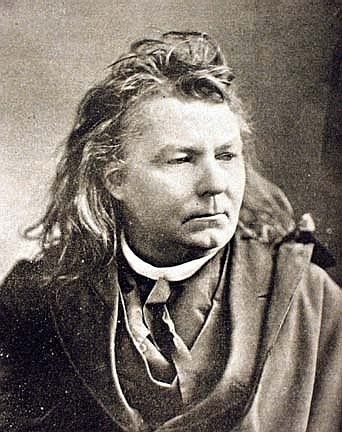 Father Abram Ryan, Poet Priest of the South
Father Abram Ryan, Poet Priest of the SouthMost Americans do not associate Catholicism with the modern south or that of 1861. Even fewer know that Roman Catholic religious and laity rallied to defend Dixie's Land from invading Yankees.
Before the war, most priests in Dixie were foreign born or hailed from the North. After the outbreak of hostilities, requests for Roman Catholic chaplains started early and priests responded enthusiastically.
When Archbishop Odin called for chaplain to serve the Confederate Army, every Redemptorist and Jesuit in New Orleans volunteered.
The Confederate Army benefited from the service of 65 full and part time Catholic priests. In contrast, the much larger Union Army, containing many times more Catholics, permitted only 40 Catholic chaplains.
Catholics of the Confederacy explores the connection of the Catholics from the south and the civil war. It's a very interesting and endearing book containing many little poems and stories about the Catholic soldiers, nuns and priests who sided with the Confederates.
Our Two Favorite Movies About The American Civil War Tell The Story From Both Sides Of The War
It is so amazing how virtues and good willed both the Union and the South are in both these movies. I, personally, like the confederacy as a whole, but when I watch these movies I wish for the destruction of the enemy and the victory of the army whether it be North or South depending on what side is currently in focus.
In Gods and Generals (2003) the stage for the opening of the Civil War is set. Men leave their homes to join the army of either the Confederacy or the Union. It shows the personal level of friendship, sacrifice and love of country.
In this movie they did a very good job of showing the differences between the North and South by the ways they lived, talked and believed.
The watcher wants both sides to win and is sympathetic to what ever side the scene is focused on.
In Gettysburg, (1993) the battle of Gettysburg is followed from the viewpoint of both the Union generals as well as the Confederate generals.
It shows the personal level of friendship that actually existed between people of opposing sides. It is easier to follow compared to Gods and Generals for a reasons like very distinct uniforms and only a few main characters names that are easy to remember.
Catholics will enjoy this movie more because, although religion was displayed, there is no strong Protestant feel as there is in Gods and Generals.
A Favorite Civil War General: Lee's "War Horse" General James Longstreet
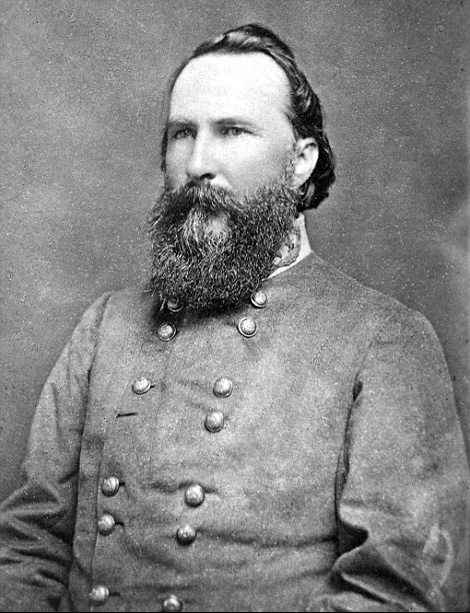
Often called “Lee’s War Horse”, General James Longstreet was a civil war general who fought for the South’s cause. He fought many influential battles including the First and Second Battle of Bull Run, the Battle of Antietam and the Battle of Fredericksburg. After the death of Jackson, Longstreet became Lee’s most dependable general. He had a strategic mind and was very precise and deliberate in his planning.
During Gettysburg, he oversaw Pickett’s charge. Longstreet already knew what the outcome of this battle would be and oversaw this charge very reluctantly. He greatly advocated withdrawing and outflanking the Union army from the right. His advice was not followed. Many people today blame him for losing the Gettysburg battle. This is, however, quite untrue as Longstreet could not have disagreed with Lee’s strategy more than at Gettysburg.
Longstreet converted to Catholicism on March 7, 1877, only a few years after the war was over. This fact, along with his support of the Republican party, made Longstreet very unpopular among the Confederate veterans. General Longstreet died in the year 1904 at the age of 82. His requiem Mass was celebrated by Bishop Benjamin Keiley.
Subscribe To Our FREE Email Newsletter:
Awards:


#RebuildChristianArt Blog
An aid for families encouraging the reconstruction of the social fabric by sparking interest in Christian art and culture. Find beautiful novels, films, music, food and customs.
